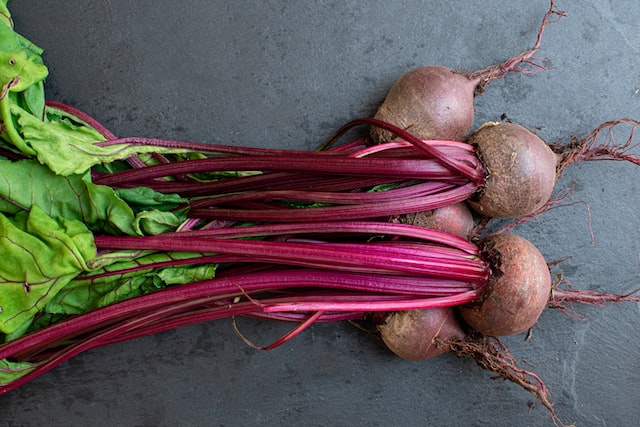
It is important to understand what nutrition and health benefits beets may provide for chickens, as well as any potential risks or dangers associated with feeding them too many beets.
In this article, we will explore the topic of whether chickens can eat beets and answer some important questions about how best to serve them.
Contents
The Nutritional Value of Beets for Chickens
Beetroots contain various vitamins and minerals that can benefit chickens, including
- zinc
- iron
- folic acid
- and lots more.
They are an excellent source of dietary fiber that helps with digestion and keeps chickens feeling fuller longer.
They also contain high levels of antioxidants that help reduce inflammation and support heart health.
These nutritional benefits make beets a great choice for supplementing a chicken’s diet with something other than just grains or standard chicken feed pellets.
How to Prepare Beets for Chickens
When serving raw beets to chickens, it is important that they are cleaned thoroughly before being served. Dirt and bacteria can easily contaminate raw foods, so they should be washed off.
After cleaning, the outer skin of the beet should be peeled off. While strictly speaking, they do not need to be cooked before feeding them to chickens; it is the safest option. That way, you can be sure any potential parasites or diseases hiding in the soil they were grown in are eliminated.
Related: Can Chickens Eat Mustard Greens?
Canned or cooked beets are safe options if you don’t have access to fresh ones; however, make sure there is no added salt or sugar, as these ingredients can cause harm over time if ingested by chickens in large amounts.
Can Chickens Eat Other Parts of The Beet?
Yes, chickens can also eat beet greens, beet stems, and beet tops.
They can even eat beet peels if you are keen on eating the main part of the beet yourself. They may not like the peels as much as the stems, leaves, and other parts of the beet, but it won’t do them any harm.
Chickens are great for eating scraps and leftovers that we ourselves may not want.
Dangers of Feeding Too Much Beet To Chickens
Beet greens contain oxalic acid, which can cause problems if consumed in excess by chickens. It has been known to interfere with calcium absorption, which could lead to deficiencies over time if not monitored carefully.
In addition, high potassium levels from eating too many potatoes have been linked with kidney damage. Hence, moderation is key when feeding your chickens any kind of potato-based food, including canned or cooked potatoes and sweet potatoes or yams. But that’s another story for another blog post.
If your hens seem lethargic after consuming beet-based dishes, then it may be best that you limit their intake until you figure out why they are reacting this way.
It could also indicate an underlying issue within their normal diet, like a lack of quality protein sources or vitamin deficiencies that need to be addressed instead.
Usually, feeding your birds a well-rounded diet can eliminate most problems. If they don’t have too much of any one food, then they should get all the nutrients they need and not get overloaded by things like oxalic acid if they eat too many beet greens.
Also read Can Chickens Eat Shrimp?
Alternatives To Feeding Beets To Chickens
While beets certainly provide some healthy perks for your feathered friends, other vegetables can replace them if necessary, such as:
Treats made from fresh fruits like apples and strawberries are also always popular amongst backyard flocks, so long as you remove any seeds prior to serving — though sometimes they like the seeds, for example, when they eat squash.
It can be a good idea to add some live mealworms into their feed bowls every now and then to help boost their protein intake. It’s a nice change from having to rely solely on commercial poultry feed pellets.
Finally, providing plenty of access to clean water at all times is essential so that birds maintain proper hydration during hot summer months or especially cold winters when snow accumulates quickly outside their coop.
Conclusion
Beets are a root vegetable that offers many health benefits to chickens.
They are an excellent source of Vitamin C, folate, and fiber.
When feeding beets to chickens, it is important to cook them first, though not absolutely necessary, but it does make them easier to eat and more appealing.
Chickens can also eat other parts of the beet plant, such as the leaves and stems.
It is important not to feed too much beet to chickens as they may experience gastrointestinal distress.
Some alternatives to feeding beets to chickens include carrots, sweet potatoes, and squash.
Photo by Emma-Jane Hobden on Unsplash.

